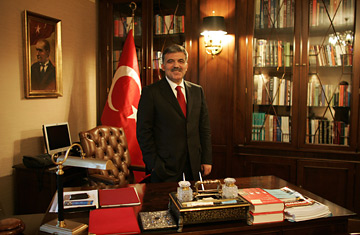
Abdullah Gul poses in his office in Ankara
Turkey today passed a political landmark when, for the first time in its history, a politician rooted in political Islam was elected President. Bringing four months of government turmoil to an end, Abdullah Gul won the post on the third round of balloting by the nation's parliament.
Originally nominated in April by Prime Minister Recep Tayyip Erdogan, co-founder with Gul of the Justice and Development Party (AKP), Gul's name on the slate evoked thinly veiled threats of a coup by Turkey's staunchly secularist military. Seeking a public mandate, Erdogan defiantly called early elections and, in what was widely seen as a popular snub to the military, the AKP was swept back into power with a resounding 47% of the vote. Erdogan then pushed ahead with Gul's nomination, despite calls to name a more centrist candidate to stand for a position which is not particularly powerful but carries tremendous symbolic weight because it was once held by the country's Westernizing nation builder, Mustafa Kemal Ataturk.
If Gul's presidency heralds the start of a new era for Turkey, it's far from clear what that new era is going to hold. "Is this the beginning of a new period of compromise, or the start of secularist-Islamist strife?" wrote columnist Mehmet Ali Birand. A former foreign minister, Gul is widely known as a coalition builder who played a key role in Turkey's European Union membership bid, but his background in political Islam makes him unpalatable to secularists.
The military appears to have accepted his victory, but it signaled yesterday that it could step in if it ever felt Turkey's separation between religion and state was threatened. Armed forces chief General Yasar Buyukanit warned against "centers of evil that systematically try to corrode the secular nature of the Turkish Republic."
To date, the AKP have carved out a reputation as reformers; starting accession talks to join the European Union, introducing reforms under which the economy has boomed and improving human rights. Despite several misfires — like trying to introduce a ban on adultery — they appear to be moving towards the political center.
But Turkey's secularists remain deeply suspicious. Pointing to Gul and Erdogan's background as formerly hard-line Islamists, they argue that the AKP harbors a secret Islamist agenda. As President, Gul has the power to approve or veto legislation, and secularists fear that he will sign into law any bill passed by Erdogan's government without concern for the separation of religion and politics. They are also infuriated by the fact that his wife Hayrunnisa dons a headscarf — Islamic attire is restricted in government offices under laws that date back to Ataturks reforms.
Much now rides on Gul's shoulders. "He will determine developments. Everything depends on his personality, and the attitude he takes," says Birand. Educated in the U.K., Gul has made a name for himself in recent years as a moderate politician, well-liked by diplomats, who is keenly in favor of Turkey's bid to join the E.U. As long as he maintains that demeanor, his election today could yet mark the decisive end of a turbulent chapter in Turkish politics, not the beginning.
